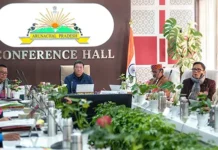[ Nellie N Manpoong ]
ITANAGAR, Feb 14: The state government is tightlipped about the joint high power committee’s (JHPC) recommendations on granting permanent resident certificates (PRC) to eligible non-APSTs of Namsai and Changlang districts.
The government is yet to come out with a statement on the outcome of the cabinet meeting held till late Wednesday night, where 44 items, including the PRC issue, were reportedly listed for discussion.
While JHPC chairman Nabam Rebia did not divulge anything on the proceedings of the house regarding the matter, he said, “We have done our job and submitted our recommendations. It is for the government to decide now.”
The last JHPC meeting was held at the civil secretarial here on 9 February, and it suggested “issuing PRCs to eligible non-APSTs of Namsai and Changlang districts in accordance with the guidelines that may be notified by the government.”
In its recommendations to the government – a copy of which is with this daily – the JHPC said the recommendations were made after threadbare discussions with representatives of all the APST and non-APST stakeholders.
The committee recommended recognizing and notifying PRCs as a regular passes under Sections 2 and 4 of the Bengal Eastern Frontier Regulation (BEFR), 1873.
PRCs, it said, “will be granted to the non-APSTs of Namsai and Changlang districts (other than Vijaynagar circle) who prove that he/she had been continuously residing in his/her original place of residence/settlement prior to 1968, or a non-APST person who is a descendent of a non-APST person who proves that he/she had been continuously residing in his/her original place of residence/settlement prior to 1968.”
In the case of Vijaynagar circle in Changlang district, the JHPC recommended that “only the original ex-servicemen settlers pertaining to the period 1964-1971 and their descendents shall be eligible for grant of PRC.”
The JHPC also recommended issuing PRCs only to original non-APST settlers/ residents and their descendents settled during the mentioned periods “in respect of whom family dossiers have been prepared and authenticated by the deputy commissioner of the concerned district.”
The cadastral survey records or the chittha registers of 1968 will serve as the primary documentary evidence to determine the eligibility of the non-APSTs of Namsai and Changlang districts for granting of PRC.
In case of Vijaynagar circle, the official records of settlement of the ex-servicemen from 1964-1971 should be the sole documentary evidence to determine their eligibility for issuance of PRCs, the JHPC said.
To segregate eligible and non-eligible non-APSTs of Namsai and Changlang districts, the JHPC suggested conducting proper survey and identification (including biometric ID) of all the non-APSTs living in their respective areas before issuing PRCs.
While the JHPC prescribed carrying out detailed modalities for identification of eligible non-APSTs, it said “PRCs will not confer any benefit of APSTs to the non-APST PRC holders. Nor will it confer any right to the non-APST PRC holders to claim APST status at any point of time in future.”
“Having a PRC will also not confer any rights to non-APST PRC holders any rights to acquire any tribal land and immovable property in APST inhabited areas,” it said.
Candidates eligible for PRCs will also have to take an undertaking that they “shall not violate the terms and conditions set by the government with regard to issuance of PRC,” the committee said.
Enrollment of non-APSTs in voters’ lists should not be made a criterion for issuance of PRCs to non-APSTs in the two districts, it said.
The committee also suggested enacting a law (in pursuance of Clause 5 of Article 19 of the constitution) to provide protection of the rights and interests of the indigenous APST people of the state, and to keep provision for clear distinction between the rights of the APSTs and those of the non-APSTs.
The Adivasis, Deoris, Morans, Ahoms, Mishings, Kachari Sonowals, Gorkhas, Nepalis and Assamese (Koibarta community) and ex-servicemen in Namsai and Changlang districts have been seeking re-issuance of PRCs for years now. Several of these communities were issued PRCs earlier, but this was stopped in 1992 by the then Lohit deputy commissioner Nabam Dai through a notification.
Issues pertaining to the districts of Papum Pare and Lohit have been kept on hold for the time being as the JHPC noted that the matter requires further analysis as they are “different.”
The committee noted that further clarifications and reports are required from the DCs of the two districts, and decided to submit its recommendations in respect of the non-APST people in Lohit and Papum Pare districts only after receipt of further clarifications and or reports and analyses.
While the Karbis/Mikirs in Papum Pare district are seeking APST status, it is said that the Assamese (Koibarta community) in Lohit district are not raising any major issues related to their current situation.
The Karbis/ Mikirs residing in the foothill areas of Papum Pare district – Chessa, Kokila, Hollongi, Balijan and Tarasso – were enlisted as APST as per the Scheduled Tribe Amendment Act of 1950, and were given ST certificates, equal opportunities and benefits by the state government, at par with other indigenous communities of Arunachal Pradesh.
However, their misfortune began after the authorities discontinued issuing ST certificates when ‘Mikir’ was amended as ‘Karbi’ for the Mikirs of Assam.
The term ‘Mikir’ is still considered a derogatory term to describe the Karbis. However, ST certificates are permissible only for Mikirs enlisted in the Schedule Tribe Amendment Act, 1950, but is not permissible for Karbis.
According to the 2011 census, the Mikirs, spread across Balijan circle, have a total population of 1063.
Massive protests have been held by various organisations in the past few months, for and against granting PRCs to long-residing non-APSTs, while most of the political leaders have maintained a safe distance.
Organisations representing non-APST communities of Arunachal had imposed an economic blockade in eastern Arunachal in January, while organisations in Papum Pare district have issued several statements, ranging from reconstituting the JHPC to giving away land to the non-APSTs to form an autonomous council.




